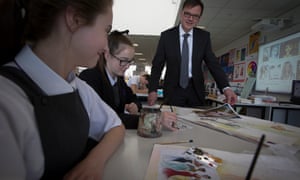
More than 100 of the UK’s leading artists have joined forces to condemn the exclusion of arts subjects from the new English baccalaureate, warning it will seriously damage the futures of many young people.
Artists including Tracey Emin, Rachel Whiteread, Phyllida Barlow, Anish Kapoor, Jeremy Deller and Antony Gormley have signed a letter, published by the Guardian, calling on the government to rethink a key secondary school policy introduced by the former education secretary Michael Gove.
The letter says there is compelling evidence that the study of creative subjects is in decline in state schools and that entries to arts subjects have fallen to their lowest level in a decade.
“This means that young people are being deprived of opportunities for personal development in the fields of self-expression, sociability, imagination and creativity,” the letter says.
“A consequence of this is that it places one of our largest and most successful global industries at risk, one worth £92bn a year to the UK economy. That is bigger than oil, gas, life sciences, automotive and aeronautics combined.”
Deller said he had recently been in a new flagship academy at a meeting held in a room full of mirrors. He asked “what’s this” and was told the school had got rid of its dance teacher and now used the dance room for exams. “What a terrible thing for young people, what an incredible waste,” he said.
He called the Ebacc “a huge mistake”, adding: “Thinking creatively is what is going to get Britain through a lot of the challenges of the next 10-20 years and that’s exactly what the arts do, they free up the mind.”
Barlow, who taught in art schools from 1966 to 2009, said she had witnessed the erosion of the importance of the arts at all levels within education, especially over the last 15 to 20 years.
“Without doubt, such ill thought through policies and attitude to the arts is a tragedy. People, young and old, are being deprived of the opportunities to discover their talents and abilities as artists and innovators within disciplines across the board.
“This philistinism must stop for the sake of future generations and the survival of the planet.”
Kapoor said it showed the UK was being “led by a bunch of halfwits, at best”.
He said: “The fact that we enslave our young people as fodder, and educate them as fodder for this monument to capitalism is outrageous. In older times, and not so long ago, an education meant an education in the arts and music and the classics. Have we so lost our sense of what it means to be civilised that all we care about are subjects directed to the economy. What’s wrong with us?”
The Ebacc performance measure makes the sciences, English language and literature, maths, a language and geography or history compulsory for secondary school pupils. Critics say that this has narrowed access to art or dance or music or drama as schools concentrate on core subjects.
The government wants to see 90% of GCSE pupils choosing the Ebacc subject combination by 2025. Schools are measured on the number of pupils taking GCSEs in the core subjects.
The letter adds to warnings made by many arts leaders. The former director of the National Theatre, Nicholas Hytner, called the Ebacc policy one of the “biggest disasters of the last seven years” and pointed with disdain to an assertion by the former education secretary Nicky Morgan that arts subjects could hold pupils back for years.
A study from the Education Policy Institute thinktank last year found that the number of teenagers taking GCSEs in arts subjects had fallen to its lowest proportion for a decade. The promotion of the Ebacc suite of subjects was one reason for the fall, it said.
The 104 signatories to the new letter include 15 former Turner prize winners including Lubaina Himid, Susan Philipsz, Richard Wright, Mark Wallinger, Grayson Perry, Wolfgang Tillmans and Gillian Wearing.
A department for Education spokesperson said: “Our drive to ensure all pupils benefit from a stretching core academic curriculum through the Ebacc is not a barrier to pupils enjoying a high-quality arts education. In fact, since the introduction of the Ebacc the percentage of pupils taking arts GCSEs has remained stable.
“We are investing nearly £500m in music and arts education programmes between 2016 and 2020. This includes the recent announcement of £96m to help talented pupils to attend prestigious arts institutions, such as the Royal Ballet School in London and Chetham’s School of Music in Manchester.”
